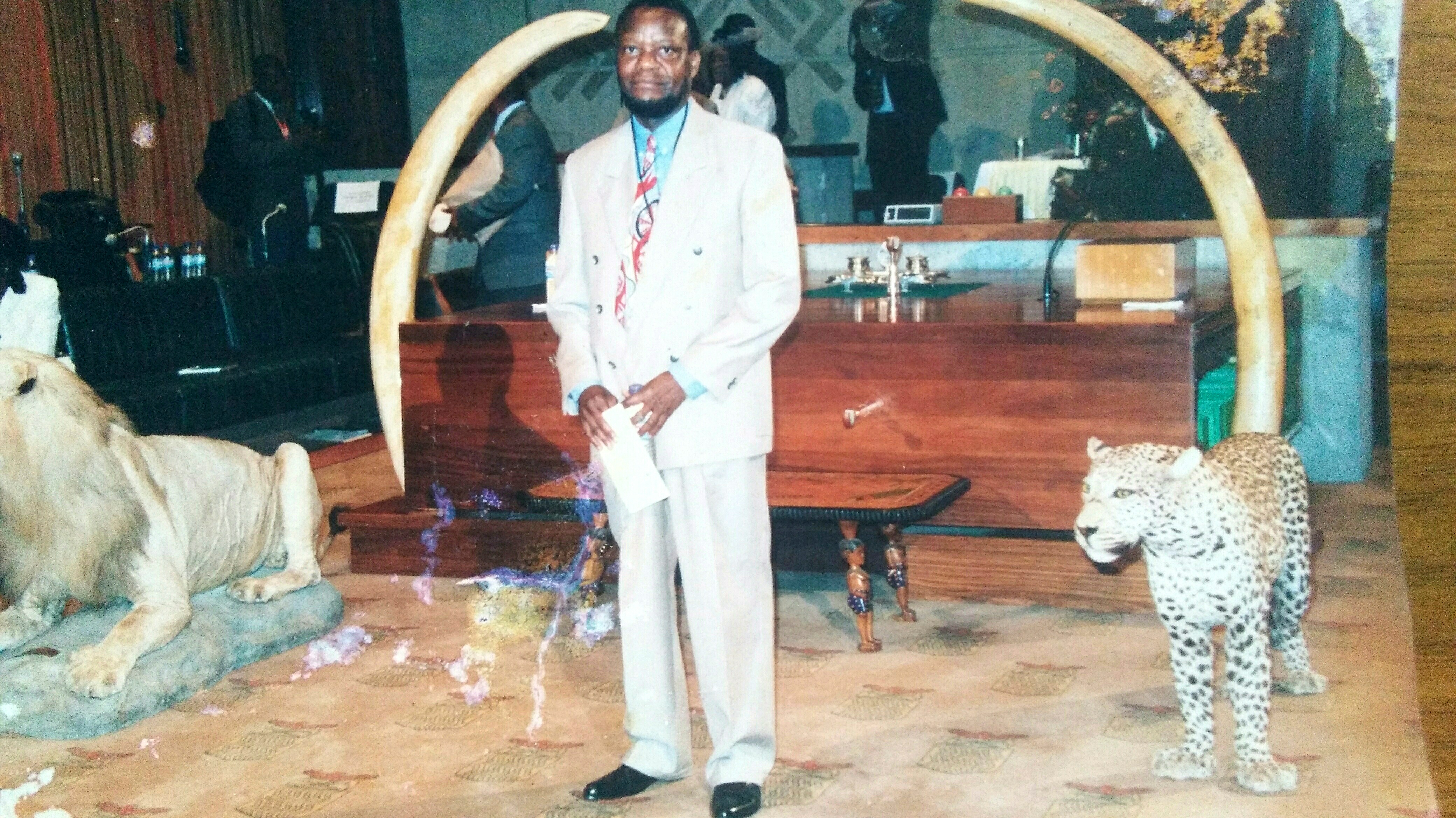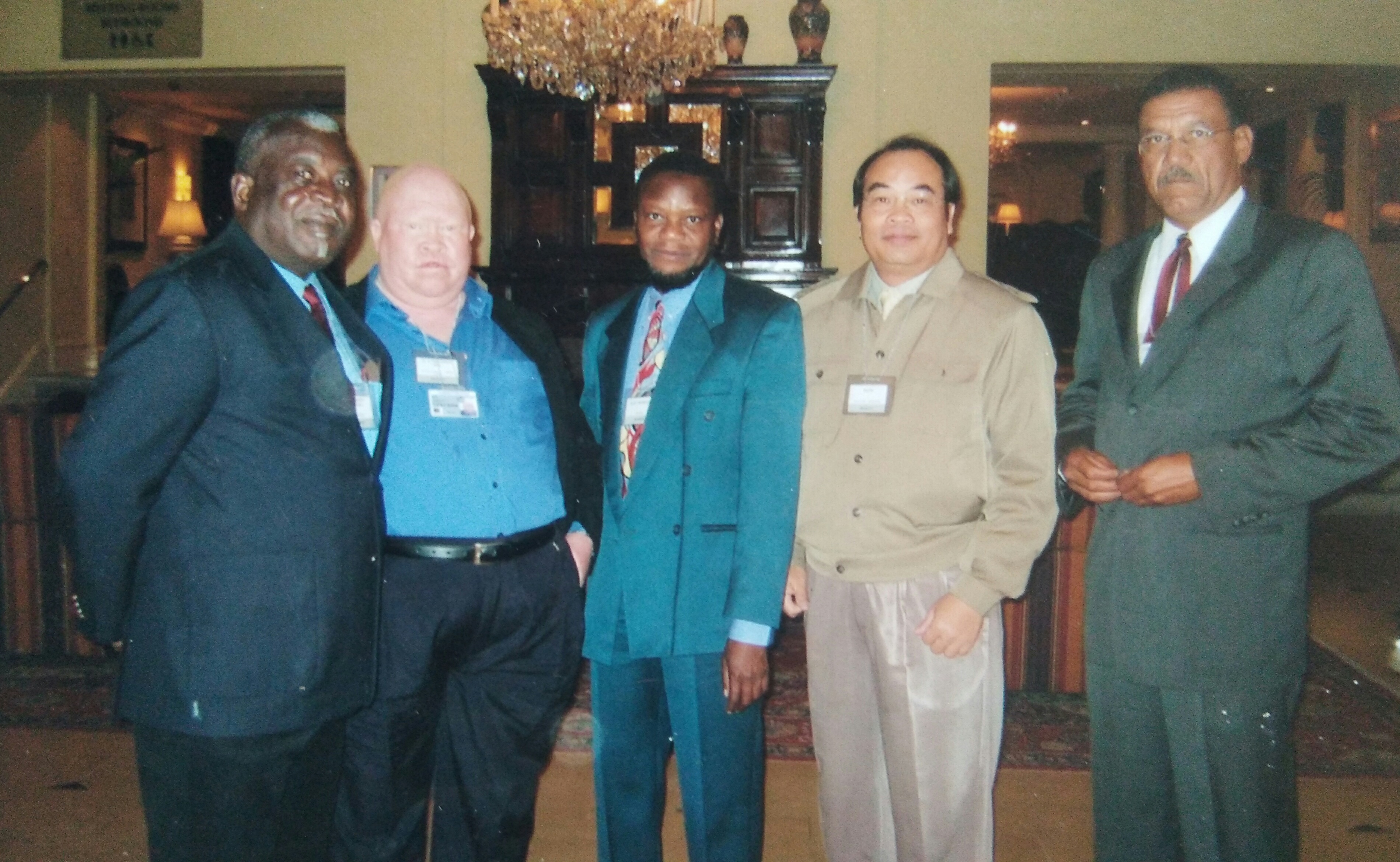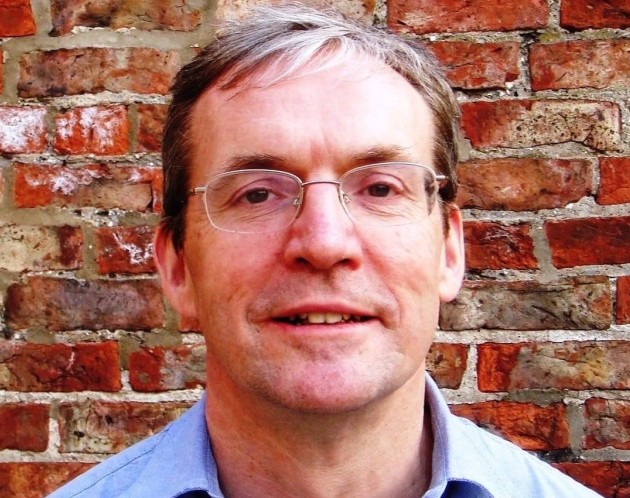Class of 1980 - 1989
- Robert John Mitchell (MSc Civil Engineering 1981)
- Alex Manda (MSc DIC Mineral Production Management 1986)
- Professor Jason Reese FInstP FREng (BSc Physics 1988)
- Brian Sowerby (BEng Electrical Engineering 1983)
- Christopher Daniel O'Keeffe (Civil and Environmental Engineering 1989)
- Dr Elisabeth Culbard (PhD Engineering 1980)
- Dr Peter J Toomey (MBBS 1983)
- Nicholas M Oatley (Electrical Engineering 1983)
- Stanislaus Jewaskiewitz (MSc Engineering 1984)
26-03-1954 – 13-04-2018
Provided by his sister, Sue Terry
Robert died suddenly at the age of 64 years. He was a lone yachtsman and his body was found in the ocean between Madeira and the coast of Portugal on 13th April 2018. His yacht, Katniss, is believed to have sunk in a storm.
Before taking up sailing, Rob had a long career as a civil engineer, specialising in the management and treatment of water. He worked overseas in the Seychelles, the UAE, Abu Dhabi, Saudi Arabia and Bahrain building dams, pipelines and waste water treatment works. However the major part of his career was spent with Thames Water where he was a senior project engineer.
Rob was a gifted child who in 1965 was awarded a scholarship to Manchester Grammar School which he attended from 1965 to 1972. At MGS he achieved academically specialising in science and maths in his senior years. In 1973 he went on to Trinity Hall at Cambridge University where he studied engineering. Later in 1980 he went to Imperial College London where undertook a MSc in Civil Engineering.
Rob married Sarah (nee Malseed) in 1984 and has a daughter Lucinda. The marriage ended in divorce in 2012.
Approaching retirement and with no background in sailing, Rob one day saw a marina full of yachts and thought “that’s what I would like to do”. Ever a man of his word and always thorough in his preparation he began to undertake a series of sailing qualifications. He researched the best yacht for a life of single handed cruising and bought Katniss in 2014. For the next four years he cruised around the Mediterranean living his dream. When disaster struck, Rob was on his final voyage back to the UK where he planned to sell his yacht and then live in Malta.
Provided by Kwan
15 November 1948 - 22 March 2004
Alex Manda, whose full names were Kajani Alex Burton Manda, completed his Master’s degree in Mineral Production Management and graduated in 1986. Additionally, he also obtained the Diploma of Imperial College (DIC). He worked for the then Zambian mining conglomerate, Zambia Consolidated Copper Mines, abbreviated as ZCCM, from 1976-2000, and served as Mine Manager – Nkana Division before the end of his tenure.
Being a Mining Engineering graduate from Newcastle University (class of 1976), Alex began his career in Mufulira, Zambia – as a Junior Mining Engineer in ZCCM under the new government’s post-independence scheme to educate young Zambians and industrialise the economy. Hailing from a small village called Mphyanakunda located in Chama, a district in the Eastern region of Zambia, Alex was determined to overcome the hardship of his background. His father was a village headman who had a polygamous marriage comprising of five wives, as polygamy was regarded as a symbol of wealth and dominance from his tribe. Alex, being the second born of a second marriage, was devoted to his work, family, and community at the same time.

Throughout the 80s, he slowly rose through the ranks in the company, while completing his MSc, degree, and later obtaining another degree in Economics from Finland. He rose to Senior Mining Engineer, Superintendent, Projects Manager, Underground Manager, until reaching the second highest position of Mine Manager – for the Nkana Division. He not only stood out as a proficient engineer, but an articulate politician who later won the respect of the nation before his demise.
Alex, faced a lot of struggle as he rose up in the mines, partly due to high tribalism and corruption at the time which stood to be an impediment to his career progression for a while. Eventually, through hard work and integrity, he rose to top management level – before the new government’s privatization programme rolled out due to pressure from the IMF as the Zambian economy was exponentially collapsing. His colleagues – superiors and subordinates, admired Alex as well. Many engineers who worked with him cited him to be key in their development and regarded him as one who was a remarkable leader.
He was heavily involved in the welfare of his community and would often engage with the Municipal council on key developmental issues, and strategize collaboratively with them to ameliorate the degradation of Mufulira town. He joined politics to tackle issues of national interest and also serve as a voice for the mine workers – as Mufulira’s economy is, to this day, heavily dependent on the mining sector.

The welfare of the miners, after privatization, plummeted to immense levels and they had ineffectual political representation – that was until Alex stood for Member of Parliament in 2001. This was his first attempt at running for parliamentary office and upon losing – he was not deterred. Two years later, he ran again and won in a landslide victory. His maiden speech in parliament was a message from the local mine workers to the President of the country. He was determined to fight corruption in the government and upon election, began to construct a healthcare facility within his constituency. He became so influential in parliament that he won the respect and admiration of the ruling party. His debates were described as excellent, articulate, eloquent, and mature, and the then Vice President, Dr. Never Mumba, encouraged members of parliament to emulate him. He did not only speak for his party, but also for all opposition parties – further redefining what it meant to be in opposition – not to yell insults and stand by while waiting to take form a new government, but to provide healthy competition to the government.
Sadly, he only served in Parliament for six months and passed away after succumbing to meninigitis. He was 54 years old. Even several years after his passing, his legacy is still highly respected in the town. His funeral was mourned by thousands of locals who still speak of him and what he did for them – both during his time in the mines, and when he served as a Member of Parliament.
He was survived by his wife, Patience, and his children, Kamo, David, Jane, Karo, Kalola, Temwani, Kondwani, Kwangu. He died on 22 March 2004. He is still so dearly missed by his family.
24 June 1967 – 8 March 2019
Professor Jason Reese, Regius Professor of Engineering at the University of Edinburgh, passed away on 8 March 2019.
A graduate of Imperial’s world-renowned Department of Physics, Professor Reese went on to complete his masters and doctoral research at the University of Oxford in applied mathematics.
During his varied career, he won awards for his work on multiscale flow systems and fluid dynamics. His research earned him the Philip Leverhulme Prize for Engineering and the Royal Society of Edinburgh’s prestigious Kelvin Medal.
He was elected as a Fellow of the Institute of Physics, the Institution of Mechanical Engineers, the Royal Society of Edinburgh, the Royal Academy of Engineering (RAEng) and the American Physical Society.
In 2018 he was made RAEng Chair in Emerging Technologies, a ten-year position to focus on the development of defence systems from molecules to machines.
Professor Reese held research and teaching positions at the Universities of Cambridge, Aberdeen, Strathclyde and King’s College London, and was appointed to a number of Government committees, including the Scottish Science Advisory Council and the Ministry of Defence’s Defence Science Expert Committee. In 2013 he took up the distinguished positions of Regius Professor of Engineering and Director of Research in the School of Engineering at the University of Edinburgh.
Away from academia, Professor Reese applied his expertise to the utilities sector, where he co-founded Brinker Technology Ltd. Their novel leak detection technology has been used in oil and gas pipelines and wellheads, and on mains water pipes.
Colleagues at the University of Edinburgh describe Professor Reese as having a ‘natural warmth and good humour’, being generous with both his time and energy in supporting younger colleagues. Professor Reese is survived by his wife Alexandra and their daughter Zoe.
1960 - 2024
Provided by his wife, Yvette Sowerby
Brian was born in, and went to school, in Chertsey.
He did well in his A levels and went to Imperial College London to study electrical engineering where his student digs in a B&B in Kensington were the princely sum of £12 / week. He graduated in 1983 with a 1st class honours degree, and he was awarded the Henry Ford certificate for the best student.
Brian was desperate to get out of London at the weekends – so he joined the Royal Artillery - Officer Training Corps, and so started his lifelong passion for all things military.
Brian worked for a few different businesses over the years, and his work colleagues have described him as one of the cleverest men they were lucky enough to work with, and he had a patent application approved when he worked for Sony. He also managed to fit in an MBA around all his other activities.
He continued in the Territorial Army for 27 years, rising to the rank of Lieutenant Colonel.
He was always keen to give back and after the TA he became a First Responder, and then joined Thames Valley Police as a Special Constable.
Brian was never without a book in hand - never a novel but usually something to do with WW1 and often written in French as he was a fluent reader and speaker. This brought him into contact with the Western Front Association and he found a real kinship there, with likeminded friends and he loved planning for and going on the annual battlefield tour.
He was diagnosed with Multiple Syndrome Atrophy in December 2019, after having a few falls and becoming less balanced. He was determined not to let the illness define him, but to keep as fit and well for as long as possible, but it eventually caught up with him in January 2024 when he passed away.
Submitted by Anita Punwani (Civil Engineering 1988)
'Danny' remained true to the engineering principles and practice he learnt at the College throughout his career as a Construction Engineer. He worked on a whole spectrum of civil engineering projects across the UK and overseas, including runways, motorways, roads, bridges, underpasses, a nuclear power station, an oil refinery, a wind turbine, a F1 stadium as well as universities, schools, hospitals, retail, commercial, and residential schemes. He was involved in projects which used some of the most innovative building methods.
His intelligence was recognised by those who taught him from an early age. As Danny recognised the importance of education, Danny taught young people to fulfil their potential, especially as he was so gifted in teaching mathematics. Danny was a highly educated and knowledgeable engineer who I recently turned to for building advice, knowing I could rely on his expertise and sound judgement.
Danny was a true team player because of his outgoing, personable qualities as well as his understanding that all trades need to work together if the client's requirements are to be met. His remarkable memory to retain information about a person's education and career progression fostered long term connections with people he studied and worked with.
Danny lived for music and concerts and always looked forward to meeting friends and making new ones through a shared enjoyment of his favourite bands: David Bowie was a constant presence in his life.
Danny travelled extensively, including making trips to Bali, Cambodia, the Philippines, India, Nepal, Vietnam, Thailand, the USA, the Caribbean, and the Middle East. He loved Nepal and found the experience of travelling to the Himalayas rewarding both in terms of the perspective it gave him as well as the friendships it fostered. His mother encouraged him and his brothers to travel widely.
A gentle, unique person, proud of his Irish roots, yet a global traveller. One who will be missed by so many friends and family across the world.
Provided by Dr Margaret Beels and Dr Jane Paxton.
1955 - 2023
Dr Elisabeth (Lis) Culbard completed a PhD in the Engineering Geology Department at the Royal School of Mines in 1982 and taught MSc students at the Centre for Environmental Technology from its outset.
Throughout her remarkable 40-year career in the engineering industry, her focus was on managing and minimising the impact of major infrastructure projects on the environment, including the Channel Tunnel, Crossrail (now the Elizabeth Line), and Doha International Airport in Qatar. Lis' other significant achievements included developing a sustainable development strategy for Gabon in West Africa, as well as numerous assignments for the World Bank. Lis also managed environmental consultancy teams in London and Hong Kong.
Lis was a director of Engineers Against Poverty, a charity established by the engineering community, reflecting the profession's extensive experience of working in countries deeply affected by poverty.
Alongside this, Lis was also an accomplished choral singer and cellist. During her time at the College, she was an active member of the Imperial College Choir and sang with the London Symphony Chorus.
She will be sorely missed.
 Peter John Toomey was born in Gibraltar in 1958 and graduated from St Mary’s Hospital, London W2 in 1982. Peter was an anaesthetic consultant in York for 25 years, having been a trainee in London and Yorkshire and Assistant Professor of Anaesthesia at OHSU, Oregon, USA. At York, Peter led the chronic pain team, introducing a multidisciplinary service and re-structuring the provision of both spinal cord stimulation and intrathecal drug delivery. He was secretary to the Neuromodulation Society of UK and Ireland and tutor to the students of York and Hull Medical Schools as well as an instructor on national and international pain intervention courses. In his spare time, he enjoyed flying light aircraft, cycling and sailing. He was a volunteer with the Jubilee Sailing Trust which helps disabled adults and children to go to sea.
Peter John Toomey was born in Gibraltar in 1958 and graduated from St Mary’s Hospital, London W2 in 1982. Peter was an anaesthetic consultant in York for 25 years, having been a trainee in London and Yorkshire and Assistant Professor of Anaesthesia at OHSU, Oregon, USA. At York, Peter led the chronic pain team, introducing a multidisciplinary service and re-structuring the provision of both spinal cord stimulation and intrathecal drug delivery. He was secretary to the Neuromodulation Society of UK and Ireland and tutor to the students of York and Hull Medical Schools as well as an instructor on national and international pain intervention courses. In his spare time, he enjoyed flying light aircraft, cycling and sailing. He was a volunteer with the Jubilee Sailing Trust which helps disabled adults and children to go to sea.
Peter died on 11 May 2020 from metastatic melanoma. He is survived by his wife Anna and their three sons, Luke, Robert and Edmund.
Provided by his wife, Alison Oatley
Nick Oatley, husband to Alison and father of James and Jess, passed away peacefully on 5 May 2020, aged 58. Nick was a talented hardware and software engineer who worked in mobile communications, the satellite industry and, latterly, in the aerospace industry.
He will be greatly missed by family, friends and work colleagues.
14.06.1951 - 8.10.2022
Stan was a professional engineer and a Senior Fellow of the Institute of Waste Management of Southern Africa (IWMSA). He was one of the most experienced environmental engineers and waste management experts, having added incalculable value across all sectors of the industry. Stan served as President of the IWMSA from 2010 - 2012 and made a significant contribution to the Institute and waste management industry.
Following a career in civil and geotechnical engineering, Stan entered the waste management and landfill industry in the late 1980s. In 2003, he founded Envitech Solutions (Pty) Ltd, focusing on sustainable technologies and projects in the environmental, waste management and mining sectors. Today, the business is headed up by his son Brendon, and is active throughout Africa and the Middle East.
Stan was highly experienced in developing waste and landfill related projects, including the design of the first licensed high-hazardous (H:H) waste landfill and the development, installation, and operation of the first landfill gas-to-electricity CDM project in South Africa. His extensive experience included geotechnical engineering, materials and site investigations, geosynthetic and natural lining systems, foundation engineering, and stability assessments.
He was an avid storyteller with an amazing ability to articulate his thoughts - one who could teleport you directly into the moment or story he would be recalling. Many of these stories were of his interesting life experiences and encounters throughout his 71 years, in both his personal journey and out in the professional field which had taken him to most corners of the world. Many had the treasured privileged of hearing some of these stories, over a double whisky, usually followed by another double whisky, and one more before going to bed!
A titan and pioneer in the waste management industry, and active until his very last day, Stan’s legacy and contribution will be long felt and long lasting. Stan was well respected, he was extremely intelligent, his understanding was impeccable, his taste exquisite and he enjoyed the finer things in life. He had a such a good sense of humour and would make jokes constantly, but at the same time would ensure the wellbeing of everyone. Always willing to hear the other side of the story while directing the conversation to a positive and productive destination.
Stan always saw the good in people and was always willing to help - never shy or hesitant to go out of his way to see what he could do to assist someone in need. Stan was always able to somehow end a conversation on a hopeful note, no matter how gloom or despairing the outlook was.
In recent years, Stan was happiest spending time with friends and family on hunting and deep-sea fishing trips. He relished any opportunity to get away to his home on the Kwa-Zulu Natal south coast when business commitments allowed. He is survived by his wife Gill, son Brendon, daughter Robyn, daughter-in-law Rosa, son-in-law Greg, and grandchildren Sophie, Delia, Ryan and Hayley.